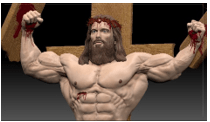I’m not sure if it is simply because I’m an area pastor, or if it is because I have two boys in the school, for one of those reasons I get to lead the Valley Lutheran Chapel occasionally. Their chapel functions a little differently than our typical worship service. We start with assigned readings – the lectionary. Those reading are shared each Sunday in a large majority of Churches. It is one of the good outcomes of the 20th century ecumenical movement. Valley’s Chapel starts with a topic. So instead of being assigned say Hebrews 12:2 as a text, I was assigned the topic: Why did Jesus die?
For most of us who have been Christians for a long time that particular question is not one we spend a lot of time reflecting upon. And if we do ponder it, we have set dogmatic answers that we accept because they make sense. The biggest of those answers is at the root of substitutionary atonement. Jesus died because only Jesus – sinless God-Man – was a worthy sacrifice for sin. Christ was our substitute. And if we are biblically literate, we might recall Abraham sacrificing Isaac and being stopped at the last moment and God providing the Ram. And we might recall the long history of Temple sacrifice of the lamb without blemish on the day of Atonement. So when the lamb of God – Jesus – shows up, his death is a necessity.
But for as bloody as that metaphor is, I’m not sure it resonates as a reason to those not deeply embedded in the story. To a pagan, the idea of my God dying would be crazy. And we should understand something here, the audience, at least a portion of the audience of even a Lutheran High School, are pagans. To a pagan, the reason you worship a God is because he is powerful. He or She might use that power for your advantage. And if they don’t use it for your advantage, at least if you offer the appropriate sacrifice, they might not use that power against you. If anyone has seen the movie “Cabin in the Woods” you know what I’m talking about. Baal and Thor and Zeus were popular not because they died. Gods don’t die. Or if they do it is because they are associated with the crops. They are popular because they are strong. And if you don’t think such gods are around today, ask yourself what we mean by “media” or “economy” and what we do. The high priests of the fed are raising interest rates, which will sacrifice some jobs, in the hope that Economy has a soft landing. That’s theology and a hidden deity.

So why does Jesus die. Why doesn’t he look like this guy? When the scoffers taunted, “If you are the son of God, come down from that cross and save yourself” why didn’t he?
For me the best answer is from that Hebrews 12:2 passage. It tells us something dear about God. “looking to Jesus, the founder and perfecter of our faith, who for the joy that was set before him endured the cross, despising the shame, and is seated at the right hand of the throne of God. (Heb. 12:2 ESV).” Why did Jesus die? For the joy that was set before him. I don’t know about you but I usually don’t associate joy and suffering. Now I might endure a workout for the endorphin high that follows, for the success of the team I’m on, to prevent myself from being on my 600lb life. But we are talking about The Cross, the most shameful and torturous death ever invented. What was this joy that caused Jesus to die?
Part of what was set before him was “sitting at the right hand of the throne of God.” That is the judgement seat. That is the seat of power. Even old Odin hung himself on a tree to get the magic runes of power. Is the Jesus story just a repeat of Odin? No way. Because when Jesus comes into that power does he immediately wreck vengeance? No. The reason that Jesus desired that power was so that he could have grace on his. Jesus doesn’t use the power is a capricious way like the gods of old or say the economy. Jesus says “come to me all who are weary and heavy laden and I will give you rest.” The God of the universe endured the cross, not to justify lightning bolts, but to lift up the sign of love in the wilderness.
“Despising the shame.” Hating everything that sin has done to his good creation, turning the garden into this wilderness, Jesus endured the cross to use the power to recreate.
The Joy of God was making a way for his people to be fully human again. The joy of God was through grace giving us the ability to follow him. To follow Jesus past death and out of the wilderness.
Why did Jesus die? For joy. For the joy of many brothers and sisters. For the joy of the new creation. The old gods, the new gods, every idol ever made? Heck with it, let it all go to hades. The God of Creation? Would not see the sinner die. And for Joy of creation created a way past death. For you.




